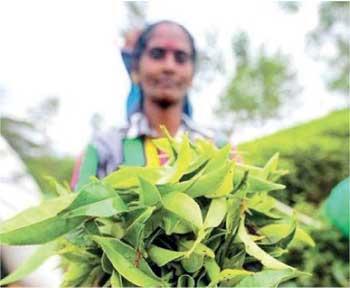18 Sep 2024 - {{hitsCtrl.values.hits}}
 By Nishel Fernando
By Nishel Fernando
Sri Lanka’s tea production is expected to fall to its lowest levels in recent history this year, dropping well below the target of 300 million kilograms, according to the Planters’ Association of Ceylon (PA).
Newly elected PA Chairman Sunil Poholiyadde warned that tea output could decline to below 250 million kilograms in 2024.
In 2022, the country recorded its lowest tea production in decades, at 251.5 million kilograms, following a brief ban on chemical fertilisers and agrochemicals. While output recovered slightly to 256.04 million kilograms in 2023, it remains under pressure this year.
“I doubt Sri Lanka will reach even 250 million kilograms of tea this year, although we had initially expected over 300 million,” Poholiyadde said.
He made these remarks during the 170th AGM of the PA in Colombo last Saturday. Poholiyadde was elected for a second term as PA Chairman, marking his fifth year in the role.
He pointed out that the industry has lost 50 percent of its labour force since 1992, a major factor contributing to the declining production figures.
“It might be in our culture to resist change, but I believe we must become more receptive to technology. Mechanisation can provide relief, especially with our diminishing labour force. Since 1992, we have lost 50 percent of our workforce, which is evident in our production figures,” he added.
Looking ahead, he stressed the need for the industry to embrace technology and prioritise sustainability to remain competitive.
“If we are to maintain production levels across all crops, we must be innovative. The technology exists globally; it’s just a matter of us embracing and implementing it. It’s time for innovative thinking, new technology, mechanisation, and automation in the field and factory. These are key areas we need to focus on in the near future,” he said.
Meanwhile, Poholiyadde highlighted the basic wage of Rs. 1,350, which will be fixed for three years, as a significant achievement for stabilising the industry.
“With all the arguments and the detailed information we provided, the Wages Board, with the consent of all stakeholders, decided on a basic wage of Rs. 1,350, coupled with a productivity component of Rs. 50 per kilo. For the first time since 1992, this wage will remain in place for three years. The first two years will be tough with a 30 percent increase, but by the third year, we can stabilise once again,” he elaborated.
10 Jan 2025 26 minute ago
10 Jan 2025 1 hours ago
10 Jan 2025 2 hours ago
10 Jan 2025 4 hours ago
10 Jan 2025 4 hours ago